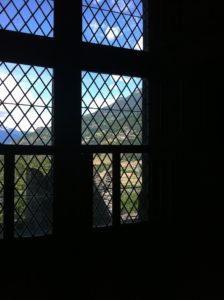Wings of Wax, Tongues of Topaz
Malcolm Schmitz is an autistic author who writes about queer people, eldritch angels, nebbish unicorns, and lace-making orcs. His fiction has been published in Crossed Genres, Fusion Fragment, and Sword and Sorcery Magazine; his short story “The Captain’s Sphere” made the Long List for the 2015 Otherwise Award.
Translator’s Note: This story comes to us from La’al Sha’ahr, the Singing City, and is a variation of a tale that’s been told for several hundred years. In the very earliest tellings, it was the tale of an akor’mar mage and her human slave; the more modern variant below is the one most commonly heard today.
Like many such fables, this is meant to be a morality tale; the lessons conveyed are traditional for the time and place. Intellectual curiosity, honoring challenges, the value of a good idea regardless of the source, and forbearance for those of both high and low station: all are virtues any La’aln mage would strive to possess.
This is a story about a rukh-sham, but it is not a rukh-sham story. For that, I’d recommend Cartier et. al, “The One Who Flew Away”, or the bard Chrysoberyl’s stinging retelling, “Wax Wings Melt”.
In the Singing City, when lions learned to dance (1), there once lived a woman called Wnissa. Wnissa was as clever as she was proud, and as proud as she was cautious.
Wnissa lived in a tower as tall as a hill, so tall that she could see the plains and savannas for miles around. She knew the secrets of the stars, the secrets of the sea, and even the true names of the mountain khurarl. She knew all the secrets of transmutation, and some arts from every other school of magic. She was so wise that she’d crafted a rukh-sham from pure topaz and not the ragged stone that most rukh-shami are made of; she named it Sabah (2), because its body was the color of light in the morning. Yet with all her knowledge and all her wisdom, she almost never left the tower; few had ever seen her face.
One day, a young princess-errant (3) came to visit Wnissa from a far-away land. She stood at the foot of her tower, and shouted up to her.
“Build me a pair of wings,” the princess-errant told her. “I wish to fly.”
“I will not,” Wnissa said.
“They say you’re the wisest woman in the world,” the princess-errant said. “If you can’t build a pair of wings, who can?”
“No one,” Wnissa said. “Any man who built a pair of wings came to great grief.”
“I need a pair of wings,” the princess-errant said, “and if you won’t give them to me, I will find someone who will.”
“Very well,” Wnissa said. “I wish you good fortune.” (4)
The princess-errant went on her way, and Wnissa went back to her books. For three days, she was still and silent, at her studies.
On the third day, the princess-errant returned, wearing a sharp smile. “Lady Wnissa,” she said. “I have found a man who will build me wings.”
Wnissa set her book down and came to the tower window. Her dark eyes narrowed. She gazed down at the princess’ earnest face.
“Have you?” she said.
“Yes. His name is Harilden. He knows a ‘mar secret from deep beneath the ground,” the princess-errant said. “He can turn feathers into wings with wax and a spell lost to mankind.”
“Those wings will never take you an inch off the ground,” Wnissa said. “There is no secret of flight.”
“He says they will,” the princess-errant said and smiled her sharp smile again. “He says he is the wisest man in the world, and with his secret, he may do what even Wnissa cannot.”
Continue reading “Wings of Wax, Tongues of Topaz”
